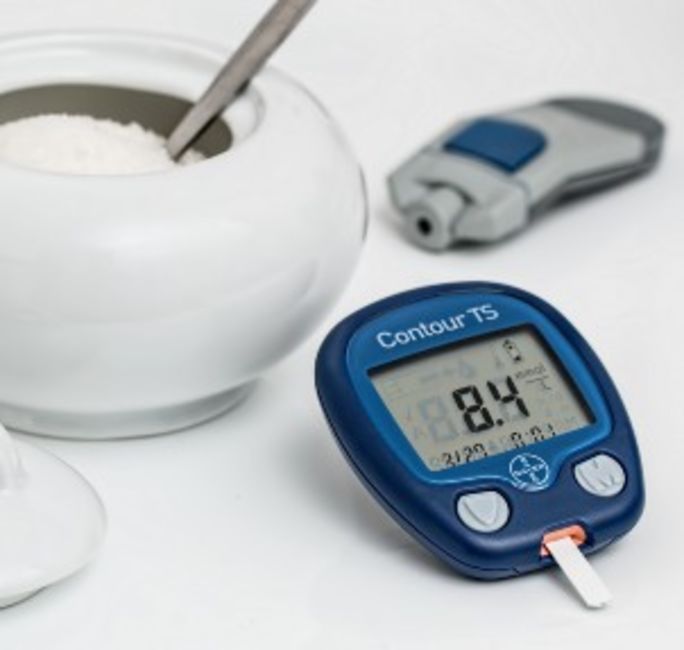Diabetes week
According to the World Health Organisation (WHO), the number of people diagnosed with diabetes has nearly quadrupled since 1980. That's why we support Diabetes Week (14 - 18 June 2021) and Diabetes UK to encourage everyone to share their knowledge and experiences of diabetes. Not only do we need to fight the challenges that diabetes presents but understand the measures to prevent diabetes type 2.
What is diabetes?
Diabetes is a serious life-long health condition that occurs when the amount of glucose (sugar) in the blood is too high because the body can’t use it properly. If left untreated, high glucose levels in the blood can cause serious health complications such as damage to your eyesight. There are two main types of diabetes: Type 1 and Type 2. Type 1 diabetes is often diagnosed in childhood and cannot be prevented, where Type 2 diabetes is often diagnosed in adulthood and can be prevented or delayed.

What are the symptoms of diabetes?
Symptoms of diabetes are not always obvious and can often be overlooked. The most common symptoms include:
- Going to the toilet a lot
- Being really thirsty, drinking more and not being able to quench the thirst
- Feeling more tired than usual
- Losing weight without trying
- Genital itching or regular episodes of thrush
- Cuts and wounds that take a long time to heal
- Blurred vision
If you’re concerned that you might have diabetes you should speak to your GP. Being diagnosed and getting the right treatment to lower your blood sugar levels to within the normal range will bring these symptoms under control.
Risk factors of type 2 diabetes
Some factors can increase the chance of getting type 2 diabetes and since the symptoms are not always obvious, it’s really important to be aware of these risk factors. They can include:
- Age. Higher risk if someone is white and over 40, or over 25 if from African Caribbean, Black African, or South Asian (Indian, Pakistani or Bangladeshi) ethnicity.
- Being obese or overweight.
- A large waist size.
- Ethnicity. Higher risk if someone is of African Caribbean, Black African, or South Asian (Indian, Pakistani or Bangladeshi) or Chinese descent.
- Family history. For example, if someone has a parent, brother or sister with diabetes.
- Medical history. For example if someone has a history of high blood pressure, heart attack or strokes, gestational diabetes or severe mental illness.
Know Your Risk
It’s not always easy to know when someone has a high risk of developing type 2 diabetes, but the simple Know Your Risk tool is a small step that could make a big difference to someone’s health.
If you want to find out your risk, or if you are someone who already lives with any type of diabetes and want to encourage others to know their risk of type 2, it’s quick and easy to find out, just click here.
To check your eligibility for the Heathier You NHS Prevention Programme, click here.
Children and Diabetes
The most common type of diabetes in children is type 1 but they can also develop type 2 diabetes. Research has shown that there are several risk factors for developing type 2 diabetes such as ethnicity, genetics, and lifestyle. In some cases type 2 diabetes can be prevented, unlike type 1 diabetes that children are born with.
The symptoms of type 2 diabetes in children are the same as they are for type 1, but they may be less obvious and develop more slowly, for example over weeks or months. The most common symptoms of type 1 diabetes in children are known as the 4 Ts:
- Toilet — Going to the toilet a lot to pass urine, bed wetting by a previously dry child or heavier nappies in babies. Getting up in the night to go to the toilet.
- Thirsty — Being really thirsty and not being able to quench the thirst. The child may ask for a drink more often, finish drinks very quickly or they generally drink more.
- Tired — Feeling more tired than usual. Having less energy than normal, not playing as often, less energy for sports
- Thinner — Losing weight or looking thinner than usual
You may also notice that the child gets more infections than usual. Symptoms of diabetes in children are the same as they are for adults but they may present differently such as a child not wanting to play games as often due to having less energy.
How to manage diabetes
There are a number of things you can do to help reduce the risk of Type 2 diabetes and manage diabetes:
- Eat a healthy and balanced diet
- Be as physically active as you can (see recommendations below)
- Avoid putting on extra weight and try to keep your weight healthy
- Set yourself health goals
- Get support to look after yourself
- Attend any healthcare appointments
Taking these small steps will help you manage your diabetes and improve your physical and mental wellbeing.
Fighting diabetes with physical activity
Being active can help manage your diabetes and reduce the risk of Type 2 diabetes by up to 40%*, as well as other mental and physical health problems.
The UK Chief Medical Officers’ Guidelines offer the following recommendations around physical activity:
- Aim to be active daily: Over a week, physical activity should add up to at least 150 minutes (2½ hours) of moderate intensity activity in bouts of 10 minutes or more. For older adults at risk of falls should incorporate physical activity to improve balance and coordination on at least two days a week.
- Improve Muscle Strength: Undertake physical activity to improve muscle strength at least 2 days a week.
- Get up: Minimise the amount of time spent being sedentary (sitting) for extended periods.
*Individual physical and mental capabilities should be considered when interpreting the guidelines.
A Better way to stay active
We offer a wide range of activities to choose from, including the gym, swimming, fitness classes and so much more. With hundreds of fun physical activities and a variety of high and low-impact fitness for all levels and abilities, there’s never been a better time to get active.
Find a Better Leisure Centre near me
Help support and fight diabetes together
This year Diabetes UK want to tell people's stories. Follow the hashtag #DiabetesStories to find out more about the condition and how it feels to live with it. For more information on diabetes week, please visit the Diabetes UK website.

